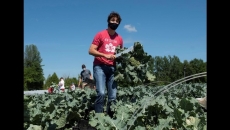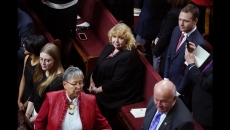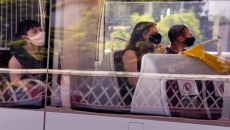The Canadian Medical Association says doctors still face hurdles getting personal protective equipment and fear they won't be able to adequately respond to increased demands for the flu shot.
With COVID-19 cases surging to new highs in parts of Canada, the CMA is calling for government action to bolster the health system so that it can handle the possibility of a devastating "twin epidemic."
"There's going to be an increased demand for PPE, probably over and above what the demand was at the beginning of the pandemic," CMA president Dr. Ann Collins said Tuesday from Fredericton, pointing to the reopening of businesses and schools as compounding pressures.
"It is an issue for protection for frontline workers."
A CMA survey conducted Aug. 19 to 24 found more than 86 per cent of 1,459 respondents worried influenza season will put additional strain on the health-care system.
Of the 598 doctors who offer the flu vaccine, half said they won't have enough doses to meet demand and 85 per cent said the system needs more capacity.
The survey also found 54 per cent of respondents still faced challenges trying to acquire personal protective equipment.
Collins said that includes surgical masks, gowns, gloves and shields needed for routine doctor visits. She says that was already an issue back in August, before the current spike in cases, demand for COVID-19 testing and school openings.
"There were areas in the country where community based physicians were having challenges accessing PPE -- they either couldn't get it, it was not a sure-thing that when they ordered it they were going to get it, (or) that they would get it on time," said Collins, who notes she had trouble supplying her own family practice back in the spring.
The survey found 68 per cent of doctors said they worried suppliers wouldn't have enough PPE, 62 per cent expected orders to be delayed, and more than half worried global demand will hinder supply.
Nevertheless, three quarters believed the health-care system was better prepared with COVID-19 resurgences than during the first wave.
The Public Health Agency of Canada said Tuesday it was preparing for the potential of simultaneous outbreaks of the flu and COVID-19.
The agency said provincial and territorial governments have ordered more than 13 million doses of vaccine -- an increase from last season's order of 11.2 million doses.
Collins says the CMA has been assured by public health officials there will be enough doses to meet demand but says they cannot predict what the uptake will be. Still, they encourage all Canadians to get the vaccine.
Each province and territorial government decides how much to purchase for their populations, where they are distributed and when to begin the rollout.
While this varies, many start their vaccination programs in October or early November.
In Ontario, Premier Doug Ford stressed multiple investments to bolster the health system as it attempts to address a backlog of surgeries while grappling with COVID-19 and the coming flu season.
"We put a billion dollars into testing and tracing, which is absolutely imperative. We also have the immunization program for the flu vaccine which is 5.1 million doses. That is the largest ever in Canadian history," Ford said.
While virtual care has reduced in-person appointments, Collins said doctors still need to see some patients face-to-face.
In addition to PPE, she said each visit requires cleaning supplies to sanitize between visits and time and staff to do that work. Collins said that all costs money.
"Doctors need to know ... that there's a concerted effort to co-ordinate (resources) amongst those different bodies and to communicate clearly to physicians what is available and to support those physicians," she said.
"There are people with all kinds of other health-care conditions that need to be seen, they need to be assessed. And so there needs to be protection for them, protection for the doctor seeing them.
"Because COVID is among us."






